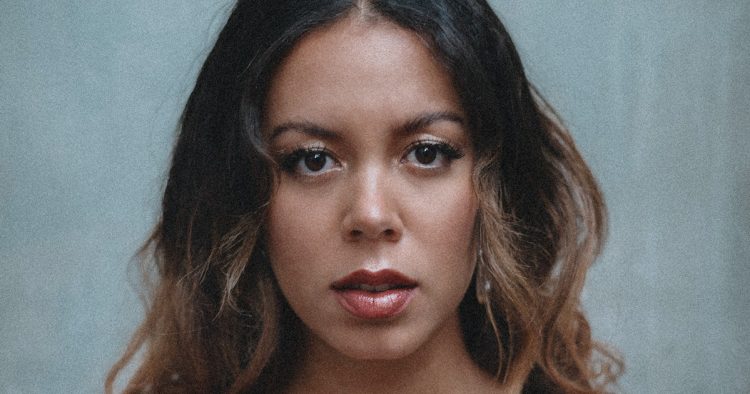There’s something quite striking about Nicôle Lecky. She’s witty and stylish, multitalented and grounded—but what stands out most about the 32-year-old English-Jamaican actress is her authenticity. When Lecky joins our Zoom call to chat about her blossoming career and her BBC Three series, Mood, she sets the tone with a confession. “I’m having an absolute ‘mare,” she says with a tinge of humor. Sporting a baby-blue, tawny-brown color-blocked teddy jacket and a sleek middle-part ponytail, Lecky explains that she’s acclimating to a new laptop after spilling water on her old one. She now has to transfer all of her backed files—a nightmare indeed. But she quickly focuses on the silver lining: “At least I’m a backup kind of girl,” she says.
Lecky is aware that transparency is the crown jewel of her charisma. “If I go anywhere, somebody is bound to come up to me and tell me something about their life,” she says. “I’m quite open as a person, and that often means people confide in you.” Lecky’s tendency toward being a keen listener with a natural curiosity about other people’s experiences helped birth her show, Mood, which Lecky created, starred in, and executive produced. The drama follows Lecky’s character, Sasha, a down-and-out aspiring singer who finds herself in the worlds of sex work and clout-chasing influencer culture while struggling with her own trauma. The six-part series, which premiered in the UK earlier this year and is coming to BBC America and AMC Networks on Nov. 6, is adapted from Lecky’s one-woman play, Superhoe. The stage production debuted at London’s Royal Court Theatre in 2019, garnering critical acclaim.
Before hitting the stage, Lecky’s Superhoe was one of many spec scripts she had in her repertoire. While studying at Mountview Academy of Theatre Arts, where she majored in acting, Lecky worked on fine-tuning her writing, cranking out scripts, and keeping her eyes open for inspiration. The storyline for Superhoe materialized after a friend showed Lecky a skeevy website where men exposed women as sex workers. After doing some investigative work on social media, she reached out to women involved in sex work, hoping to tell their stories. “A lot of them were similar to me in the sense that they were dancers, singers, or actresses,” Lecky says. “I wanted to go down that road and have a fair look without judging anybody.”
To create Sasha, Lecky also drew from her own background. Both women are from East London, an area with a diverse community that Lecky insisted on accurately portraying; both love to sing (Lecky shows off her vocal chops during musical sequences throughout the series); and both must navigate the world as mixed-race folks who experience misogynoir and microaggressions. Lecky painted Sasha with strokes of personal veracity, making the character feel like a real person with real problems and real ambition.
Photo by David M. Benett/Dave Benett/Getty Images for Netflix
Growing up in East London’s Stratford area, Lecky caught the virtuoso bug early on. As a kid, she enjoyed watching films, singing, and dancing—she’d often put on performances for her family. She didn’t see the creative arts as a career path until one of her high school teachers encouraged her to act. (Still, her professional pursuits weren’t exactly linear. Before attending Mountview, Lecky was enrolled in King’s College in London to pursue a degree in war studies. In order to prioritize acting, she dropped out and went to drama school.) She then worked on her craft and made as many connections as she could while putting in extra work to support herself. “There’s a bit of a swagger when you come from East London—that kind of hustle mentality,” Lecky says. “I would hostess, I would teach, I had so many jobs—when all I really wanted to do was make art.”
Lecky now feels empowered to expand her expertise, especially after discovering a love for executive producing while shooting Mood. “It’s not often that young women are given the reins to their own creative vision,” she says. “I really enjoyed that process.” Lecky’s series adds to the compelling list of shows created by artists who have dimensionalized contemporary womanhood on screen. In that regard, Mood joins the ranks of Phoebe Waller-Bridge’s Fleabag and Michaela Coel’s Chewing Gum—two UK programs that were also adapted from stage plays—as well as Issa Rae’s Rap Sh!t, which incorporates similar social commentary and motifs. In fact, Waller-Bridge took notice of Mood when it aired in the UK and became a fan of Lecky and the show. “She is a darling,” Lecky says of the Emmy winner. “I met her not too long ago, and we had a really lovely chat.”
Stagnation isn’t Lecky’s forte, so she’s constantly looking for ways to evolve and keep her hands full. Now that the Mood soundtrack is out, she wants to release another album—“I’ve been in the studio on and off this year, meeting amazing producers and making songs,” she says—and she’d like to direct a film. But Lecky is careful not to run herself into the ground or succumb to any feelings of inadequacy. “There are times when I’m really happy with everything I’m doing and what I’ve achieved, yet I’ll still be like, ‘I need to be doing more,’” she says. “That’s when I switch off social media, or I’ll reward myself when I’m feeling down. Ice cream has helped on many sad days.”
The stories that Lecky hopes to continue sharing will broaden the understanding of the human experience while leading with empathy and genuineness. “One thing I’m really fascinated by is the commonalities in all of us,” she says. “For me, it’s about creating honest, authentic work that speaks to people—young women, Black women, working-class people—and makes people feel seen.”
Source by www.wmagazine.com


